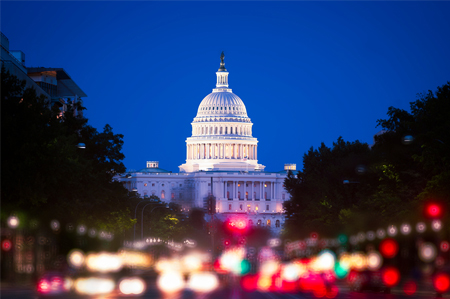No Movement
Category: Policy

(Slate) – On Day 25 of the longest government shutdown in United States history, Congress was no closer to resolving the impasse than it was on Day One. Since President Donald Trump rejected the easiest path out of the shutdown—declaring a national emergency and punting the issue of a border wall to the courts—over the weekend, the Capitol has seen its fair share of commotion. But none of that should be confused with movement toward resolution.
So what is this commotion-but-not-movement? Democrats continue to pressure Senate Majority Leader Mitch McConnell into voting on House-passed bills to reopen the government, while Republicans insist that House Speaker Nancy Pelosi needs to budge from her refusal to negotiate over border wall money. But neither McConnell nor Pelosi, the two strongest congressional leaders of the 21st century, is known for budging. When they commit to their strategic positions, they commit, and their caucuses follow them in lockstep.
There is, however, theoretically a moment when either side’s vulnerable members—House Democrats representing swing districts, and swing state Senate Republicans up for re-election—suffer enough that these leaders recognize the shutdown could endanger their majorities. A leader budges, and a deal gets cut. The commotion this week, then, has been about testing each side’s pressure points. But so far, no one seems close to caving.
Several vulnerable Senate Republicans have gone on the record calling for reopening the government even without wall funding. Colorado Sen. Cory Gardner, the Republicans’ most vulnerable senator in 2020, said shortly after New Year’s Day that “we should pass a continuing resolution to get the government back open.” Maine Sen. Susan Collins, another top target for the Democrats, has called for the Senate to at least pass the other, non–Homeland Security appropriations bills that have come out of the House, which would reopen most parts of the government. “Building the wall” is an unpopular policy in both of their states, just as it is nationally—even though it’s growing in popularity among Republicans. And Trump and Republicans are taking most of the blame for the shutdown, as poll after poll after poll in recent days has shown.
But a couple of senators feeling uncomfortable does not add up to a rebellion, does not hurt Mitch McConnell’s feelings, and will not persuade him to change course. As Texas Sen. John Cornyn—no longer a member of leadership himself, but still tuned in to leadership’s thinking—said Monday according to Politico, those senators calling to reopen government are “going to do what they need to do.” But, he added, “I don’t think that should be confused with what Sen. McConnell’s calculus is, which is: not to go through this effort of passing something the president won’t sign and then going through a potential veto override and all the conflict that would cause.”
That’s why Gardner, Collins, and others feeling heartburn over the shutdown aren’t more forceful about pressuring McConnell to change course: The alternative—defying Trump, and “all the conflict that would cause”—remains the more politically troubling course. Though Quinnipiac’s most recent shutdown poll showed only 43 percent public support for building the wall overall, 88 percent of Republicans agreed with it, and 74 percent of Republicans blamed Democrats in Congress for the shutdown. For Senate Republicans to pass a House Democratic bill that the president would veto, and then to override the president’s veto, would be viewed as treason by the Republican base. So long as the danger of defying Trump is more palpable than the danger of biding their time, vulnerable Senate Republicans are going to twiddle their thumbs and go along with McConnell’s strategy. It could be a while.
And if the Trump administration thinks it can peel vulnerable House Democrats away from Pelosi, it may be waiting even longer. The bad public polling for Trump has allowed Pelosi to take the firm position that she won’t support Trump’s wall now, in a month, or ever. But that doesn’t mean all House Democrats are perfectly at ease with the uncompromising stance. Many freshman members, especially, won longtime Republican districts and will be on precarious re-election grounds in 2020. Some of these members would like the messaging to emphasize that they’re open to compromise and that they take border security seriously. The Trump administration, in its desperation, is trying to create a wedge between these anxious House Democrats and their leader. That’s why the White House sent invitations to some centrist Democrats for a Tuesday lunch.
The invitations, though, turned into an opportunity for House Democrats to demonstrate their unity. Not a single Democrat accepted the invitation, so Trump was left to dine with a group of powerless House Republicans. (These Democrats apparently didn’t need to be pressured into declining the invitations, either: Pelosi said she didn’t care if they accepted them. “They can see what we’ve been dealing with,” she told her leadership team. “And they’ll want to make a citizen’s arrest.”)
Later Tuesday afternoon, a group of Democratic freshmen held a press conference to emphasize their unity, and to pressure—you guessed it—McConnell into holding votes to reopen the government. One reporter asked if they all stood by Pelosi’s position that they wouldn’t fund more than one dollar’s worth of the border wall.
“A border wall is off the table,” California Rep. Katie Hill said. No dissent was voiced.
Donald Trump will not pick off a meaningful number of House Democrats, if any, from Nancy Pelosi’s clutch. Democrats do not want to reward Trump’s hostage-taking, they don’t feel that they need to make the first move when Republicans are taking the blame for the shutdown, they trust Pelosi’s skill set, and the border wall is still unpopular. And Republicans aren’t moving because they are scared of Trump’s Twitter feed.
No one is breaking at either of these pressure points right now. Vulnerable House Democrats are sticking by Pelosi, and vulnerable Senate Republicans are sticking by McConnell, who is sticking by Trump. They’re all stuck.




